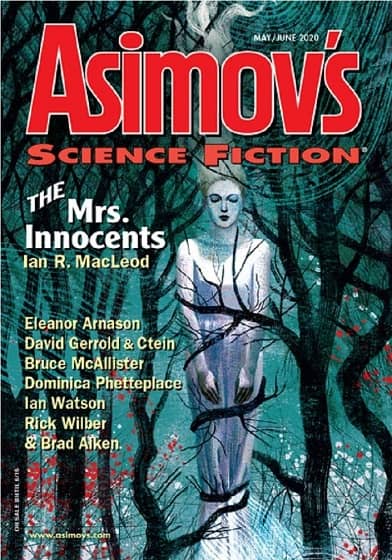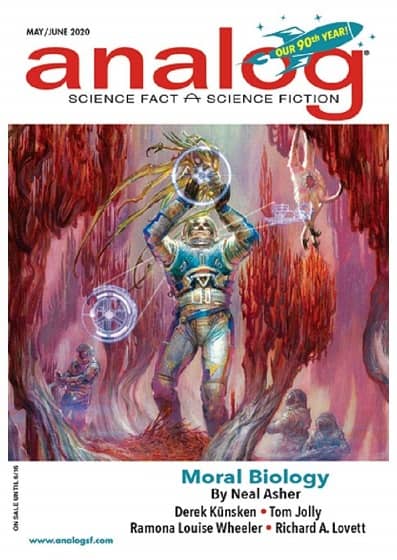Star System Politics and Factions: Dell Science Fiction Reviews
 |
 |
Dominica Phetteplace is a name to which I pay attention, after having read many of her works now in Asimov’s. If I don’t point out her work enough, it’s because Phetteplace doesn’t usually construct whirling plots or astonishing metaphysics*, but instead sculpts a very convincing and immersive (what the literary genre calls “slice of life”) simulation of normal people living in a near-normal future. Phetteplace’s vision, on average, is ingenious, and “Digital Witness,” in the current issue of Asimov’s, is a standout.
Phetteplace’s attitude about our social-media-saturated future is both accepting of it and pragmatically cynical. This story, despite all of its darkness, is not a shrill prophecy about dystopia. If there are warnings here, then they are that marketing and digital commodities will have to be altruistically revolutionized. Rather, Phetteplace’s meditation seems resigned to how “business” will be conducted, how it will affect relationships and “true” social lives. Any canny reader should recognize that this reality is upon us now. And, if Phetteplace’s protagonist in the story actively works in the field of data mining, Phetteplace herself seeks to avoid self-commodification. In the editorial foreword, Phetteplace says that the story was inspired by herself choosing not to download an app that her physical therapist claimed would be of use to Phetteplace in monitoring back pain. In context of the story that Phetteplace ended up writing, it is clear that Phetteplace expected that following her therapist’s advice would infringe on her privacy and result in her information being traded within the digital marketplace.
In short, this is what this story is about: data mining as a business, showing what nefarious uses may result from it, and how commonplace in our world this already seems to be. Phetteplace strikes me as a very powerful and literary writer of science fiction.
So, I’ve been reading Asimov’s for years, and my introduction to R. Garcia y Robertson was, I think, for me a fairly onerous novella set in the universe every consecutive story of his—stories that seem to appear every other issue or so — likewise inhabits. The reason why that first story was so difficult for me, I think, is because of how high concept it is. Imagine our solar system almost utterly colonized with gee-whiz science and technology reminiscent of Marvel Comics Asgard. Post-humanism, cloning, AIs, VR, genetic modification—all are the norm. All sorts of technological marvels — including weapons — possess cute and evocative acronyms. There are a number of Earth-history analogues — the British MI5, Mongols, Space Vikings, to name a few — ported into the milieu in toto. The central dramas typically entail outer system slavers abducting children from the midst of indifferent adults and sometimes parents and corrupt governments. Without suitable protection, these children are forced to take their own offensive against the slavers.
In this context, our children heroes behave like adults in every way, and I surprise myself to learn that I retain what I’m going to call conservative or normative values when I’m uncomfortable with these children developing sexual feelings for adults. With consideration, I recognize that these relationships makes sense, in a progressive, transhuman sense. My attitude resulting from my first encounter with Garcia y Robertson was that he seemed to be showing off, as he writes with a terse, no-nonsense vernacular that rattles inexorably forward, slinging images and science fiction concepts like meteor showers. His prose is like some crazy, post-Gibson beat writing. There’s a lot here. The novum per page (to cite Tom Shippey’s “Hard Reading: The Challenges of Science Fiction”) are explosive. I think it was Asimov himself who cautioned that a good science fiction story should contain only one significant departure from our dominant, consensual reality (what Shippey differentiates from “novum” with “datum”). Garcia y Robertson, to reiterate, utterly ignores this. His fiction reads not only as a mixing bowl of every available science fiction conceit, but as a genre mash. As my Norwegian-immigrant progenitors would say (and I do), Uff da!
When I encountered another story by Garcia y Robertson, and then another one, all set in his far future slipstream solar system, all involving super-power/tech children and their war against child abductors, I was tempted to ignore it, not to read it, to skip it. But, if writers talk about the value of a good editor, perhaps this reader should, as well. Each time I trusted the choices of Asimov’s editor Sheila Williams, I dutifully read each consecutive offering from Garcia y Robertson, and slowly, slowly, I began to find my footing within Garcia y Robertson’s bonkers universe. Then, over time, I realized that I had come to enjoy it, to really enjoy it.
So I’ve arrived at Garcia y Robertson’s “Living in Wartime,” in this issue, and another feature of his writing that I have begun to notice is just how canny he is with history. This story makes many, many references to WWII, and two passages, with present times in mind, affectingly stand out.
America’s forgotten what freedom and democracy means. … We don’t give a damn for free elections or saving kids. We’re all about power politics trying to win mean and nasty folks over to our side, so we can beat the Russians or something equally silly. You cannot beat the Russians by being bad. Russians excel at bad. In the Last World War they suffered five thousand dead a day and kept fighting until they hung [sic?] the Nazis on their own gallows at Auschwitz. Bad does not work on folks like that. Russians only respect us when we do right. They loved General Eisenhower, Stalin’s favorite American. Ike did it right and met them on the Elbe. Krushchev said, “Stalin likes Eisenhower, a class enemy, and Stalin does not like anyone.” That was back when we knew right from wrong. Now we’re deathly afraid of folks doing the right thing and offending the bad guys, so Princess Rylla [leader of the children’s crusade] is an outlaw, and I’m [a lieutenant in those ranks] facing police charges. Our motto used to be “In God We Trust.” Now it’s “Be Kind to Psychos.”
I’ll forebear to say precisely why this reminds me of present times. I don’t want to rile anyone here. I’ll leave it by saying that I’m affected by this characterization.
Everyone should be reading Derek Kunsken’s serialized novel The House of Styx in Analog. It concludes next issue.
It started out cool, then it got really cool. I want to make comparisons to Dune. In The House of Styx, we have a very interesting planet—Venus—that Kunsken has imbued, mostly through the perspectives of his characters, with a numinous personality. People live quite interestingly “in” this inhospitable planet. I say “in” because colonists have to live in floating habitats and in suits in the poisonous gas clouds; there is too much heat and pressure on the surface of the planet for any meaningful activities to take place there. Some people worship Venus, exposing themselves to her in a masochistic attempt at “belonging” to a planet within which their species did not — could not ever — evolve. There are politics and factions. There are the weird and awe-inspiring.
This tells me I definitely have to go back and explore the worlds of Kunsken that I have missed. I know The Quantum Magician had wrapped up just before I became a subscriber to Analog. Luckily, these days, everything is perennially available electronically. I can read it in its novel form, but I think I’ll go back to those issues of Analog so I can read the other stories, too.
*I take it (sorta) back. After writing those words, quite accurate ones in regards to the story at hand, I came across a hard science tale from Phetteplace in Analog. Clearly she possesses rich and diverse talents.
Asimov’s Science Fiction and Analog are available wherever magazines are sold, and at various online outlets. Buy subscriptions at the links below.
Asimov’s Science Fiction (208 pages, $7.99 per issue, one year sub $47.94 in the US) — edited by Sheila Williams
Analog Science Fiction and Fact (208 pages, $7.99 per issue, one year sub $47.94 in the US) — edited by Trevor Quachri
The current issues of Asimov’s and Analog are on sale until June 16. See the last article in this series here, and all our recent magazine coverage here.
Gabe Dybing has been a small magazine editor (Mooreeffoc Magazine 2000-2001), often a writer, and usually a gamer. He is most interested in the “northern” fantasy tradition and frequently examines intersections between that topic and gaming. For Black Gate he has contributed many articles, including pieces on Poul Anderson, J.R.R. Tolkien, and roleplaying games. His most recent review of Dell Magazines was Write Your Legislators: Dell Science Fiction Reviews.